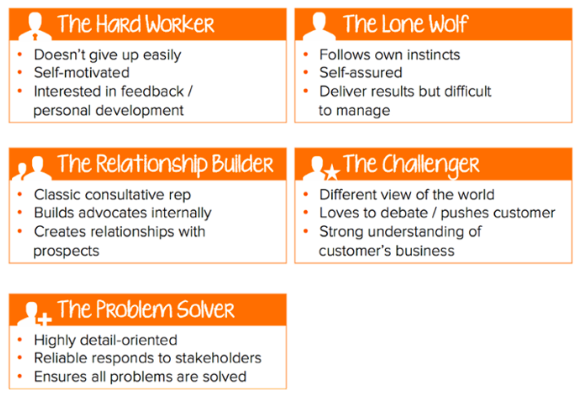Sales veterans know that selling to an executive is a much different experience than selling to an individual. Executives likely will never use your product or service, and run tight schedules with competing priorities. Just getting a meeting on the books is a big win.
To better your odds, we amassed a panel of busy, tech CEOs to shake out tips on how to sell top-down.
Below are the can’t-miss highlights of the exchange between Ryan O’Hara, VP of Marketing at LeadIQ and 3 CEOs of high-growth companies: Olof of Mixmax, Ray of Chorus.ai, and Eric of Terminus.
Embody a Challenger Sale Mentality
Matthew Dixon, author of “The Challenger Sale” argues there are 5 main personalities of B2B sales reps:

Overwhelmingly, while persistence and relationships are important, each CEO cited examples of reps who caused them to think deeper, and ask internal questions, as being more memorable, and effective with their pitch.
It makes sense, as studies found that high performing reps are 2x as likely to use a Challenger sale approach, over any others.
Get the Executive Thinking
Strengthen their domain expertise but shaking up assumptions.
Olof reveals one of the most detrimental beliefs of an executive is to, “build up functions where you have had a little bit of expertise, because you’ve done it to some extent.
An example of this: earlier on I did all sales for the company. I thought I totally knew what sales was all about. Then I hired our first sales rep, and they totally schooled – which was eye opening and wonderful.”
It’s near impossible for an executive to be an expert in every function & speciality. And in many cases, the area where they have historic sole contributor experience has evolved considerably. This is a chance to demonstrate value without going straight into your pitch.
Reveal data points and insights into impactful areas of the business.
“I like to learn about best practices, especially from our Industry, that maybe we’re not doing. It’s the fear of missing out. Not knowing what you don’t know.” – Roy

Ask pointed questions that open dialogue.
Sometimes you may shoot too high and find the executive approached a broad budget for their department head or team lead, and they have full discretion in spending it. Instead of going into your usual pitch, instead spark curiosity, so they bring up the topic to their team leads.
“Is there a question you can get the CEO to ask somebody on their team? To start a conversation. Tell me what I should dig into if there’s an opportunity there.” – Roy
Set the follow-up.
“Ask upfront for the permission to reach out afterwards, to see how the conversation went”. – Roy
Humanize the Sale
Authenticity and excitement go a long way.
“For cold email, some degree of flattery works. You see through it, but it puts you in a good frame of mind. It’s 1000x more interesting if the rep actually uses your product or service and can reference it intimately.” – Olof

Get personal.
“For anything coming from someone I don’t know, anything that is hyper-personalized will get flagged and read, but outside of that, I never see it. If an email looks like they have a relationship, or put an extensive amount of time personalizing it, I at least want to look at it.” – Eric

To sell is human.
“ [ They’re] normal people, I think that’s what most people miss out on. Many started as employee #1 or #2 in their organization.” – Ryan

“Whenever an email comes in, it goes to one of two parts of my brain: it either goes into the professional part, or it goes into the personal side. I handle the two completely differently. If something comes in that’s classified on the professional side, I have to rank it against every other priority I have. And there can only ever be 2-3 priorities there; and everything else gets blown off.
When something comes in on the personal side: I’ll make time. There’s a lot more flexibility if something comes in a little less than purely professional. Trying to find a way to make it human can go a long way.” – Roy
Work Your Network
Leverage your team to get in the door faster.
From one EA to another.
“The EA relationship can be critical to getting meetings, and in many cases, open doors that I normally wouldn’t be able to.” – Eric
Find team members with personal relationships.
“When there’s a personal relationship there, it can be extraordinarily effective.” – Eric
Try to get into a deal cycle with current vendors your company is using.
Leverage the existing relationship, customers are often treated differently.
Title matters.
If you’re struggling to get in touch, try your VP, Head of Sales, or even your CEO to get a foot in the door.
Should You Sell to the CEO?
The answer is: it depends. If you’re looking for a direct intro, advice, or to influence top level priorities, then it can be worth it. If you’re looking to hard sell, get around department heads, or to take up a lot of time, the answer was overwhelming no.
A few things to take in account:
Reach out in the odd hours.
“90% of emails I hit archive. The one thing to did actually reach me was phone calls. If people call me, I do occasionally answer the phone – I’ll take a call super early, or on my commute home, or while working out.” – Roy
“Early mornings and late nights is when I work my inbox.” – Eric
“My phone is silent during the entire work day, and I don’t have voicemail set up.” – Olof
Cozy up to the gatekeeper.
“The EA relationship can be critical is getting time with meetings. There’s opportunity to learn from them on getting a meeting more effectively.” – Eric
Understand their needs by stage.
“Every 6 months as a CEO, you need to look at yourself hard, and understand how the business is changing.” – Roy
“As the company grows, the needs change. Companies selling products that we don’t need right now. Timing is so important.” – Olof
Key Business Inflection Points:
- Finding Product-Market Fit
- Scaling the Business
- Creating Strategic, Lasting Growth
For heaven’s sake, follow-up!
“I may tell them the best time to follow up. For example, I have BI solutions who are still in-touch with me 18 months later – and I love that. Now we’re at a place to evaluate that software and that’s who will be hearing from us.” – Olof
You’re likely to get back-channeled over a direct response.
“I’ll forwarded them to someone if I think it’s interested, or at least forward to our sales team, saying, hey this one at least got me to read it, and here’s why”. – Eric
They are often not the final budget holders.
“I almost feel like I don’t have budget anymore.” – Eric
“I really trust my team and tell them, you have the D [ ecision].” – Roy
Don’t go in for the hard sale, be helpful.
“If you want me to take action on something: ask a single question.”
Such as: “Do you know the percentage of your highly personalized emails are bouncing? Because that’s going to be impacting your ability to hit your numbers and grow. In your next 1-on-1, with your VP of Sales, ask them that question. If it’s between [ here] and [ here], then you’re OK; if not, it’s likely worth a conversation to improve upon it.” – Roy
“As a CEO you’re constantly so stretched, and constantly looking for help. Help coach us on things we want to think about for the company to grow.” – Olof
People and customers are always top of mind.
While they may defer software and service decisions to their heads of the respected departments who they trust, CEOs want to be intimately involved with mission critical purchase decisions such as Security, Compliance, and People (both employees and customers).
“It’s the organizational health, and things relating to the people. I deeply care about that. I want to see anything that will affect the team.” – Eric




